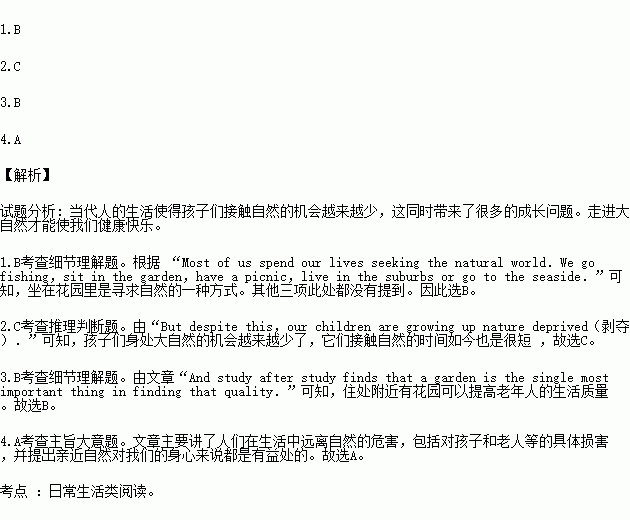题目内容
Most of us spend our lives seeking the natural world. We go fishing, sit in the garden, have a picnic, live in the suburbs or go to the seaside. The most popular leisure activity in Britain is going for a walk. When joggers jog, they don’t run the streets. Every one of them tend to go to the park or the river.
But despite this, our children are growing up nature deprived (剥夺). I spent my boyhood climbing trees. These days, children are robbed of these ancient freedoms, due to problems like crime, traffic, the loss of the open spaces and strange new ideas about what is best for children, that is to say, things that can be bought, rather than things that can be found.
The truth is to be found elsewhere. A study in the US: families had moved to better housing and the children were assessed for ADHD—attention deficit hyperactivity disorder (多动症). Those whose accommodation had more natural views showed an improvement of 19%; those who had the same improvement in material surroundings but no nice view improved just 4%.
ADHD is one of the great problems of modern childhood. One study after another indicates that contact with nature gives huge benefits to ADHD children. However, we spend money on drugs rather than on green places.
The life of old people is measurably better when they have access to nature. The increasing concern for the growing population of old people is in quality rather than quantity of years. And study after study finds that a garden is the single most important thing in finding that quality. Even problems with crime and aggressive behavior are reduced when there is contact with the natural world.
We need the wild world. It is essential to our well-being, our health and our happiness.
1.According to the author, people enjoy ________ to seek nature.
A. jogging on the street
B. sitting in the garden
C. shopping in the supermarket
D. running in the gym
2.From the second paragraph, we can see that ________.
A. adults deprive the children of their rights to approach nature
B. climbing trees will certainly do good to the children
C. children probably spend less time in nature nowadays
D. children tend to be happier as a result of their material satisfaction
3.In what way do people benefit from their contact with nature?
A. Children with ADHD can be cured.
B.A garden nearby improves the quality of old people’s life.
C. Problems with crime and violent behavior will easily be solved.
D. Children’s performance at school is greatly improved.
4.What is the main idea of this passage?
A. Access to nature improves our life.
B. Nature treats children with ADHD.
C. Getting close to nature reduces crime.
D. Man can’t live without natural areas.

